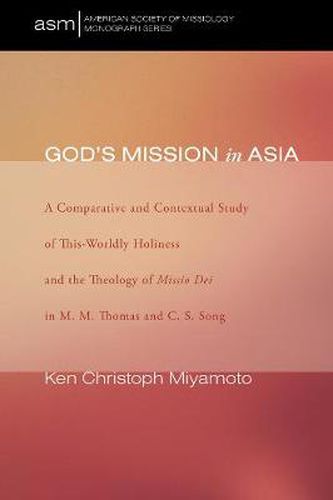Readings Newsletter
Become a Readings Member to make your shopping experience even easier.
Sign in or sign up for free!
You’re not far away from qualifying for FREE standard shipping within Australia
You’ve qualified for FREE standard shipping within Australia
The cart is loading…






This title is printed to order. This book may have been self-published. If so, we cannot guarantee the quality of the content. In the main most books will have gone through the editing process however some may not. We therefore suggest that you be aware of this before ordering this book. If in doubt check either the author or publisher’s details as we are unable to accept any returns unless they are faulty. Please contact us if you have any questions.
Ecumenism in postwar Asia, institutionalized in the Christian Conference of Asia, displayed a remarkable this-worldliness from its inception in the 1940s. This tendency was in contrast to the tension between the church-centric and world-centric approaches to Christian mission that marked conciliar mission thinking in the West. This work examines the development of such this-worldly holiness in Asian ecumenism, focusing on M. M. Thomas of India and C. S. Song from Taiwan. Special attention is drawn to the idea of God’s this-worldly presence that considers God as redemptively at work in world history apart from the church. The study first compares the development of this-worldly holiness in the West and Asia and then examines the thinking of Thomas and Song. The chapters on these two theologians discuss their backgrounds, the basic concerns motivating their intellectual searches, and responses to the questions arising from such concerns. These chapters also try to understand how these theologians view the relationship between God and the world. In so doing, the study highlights the significance of the idea of God’s this-worldly presence shared by Thomas and Song in spite of differences in their backgrounds, approaches, and theological formulations. Having compared Thomas and Song, the study concludes that the idea of God’s this-worldly presence became central to Asian ecumenism because it offered a common unifying vision to Asian Christians who come from a region characterized by tremendous diversity. The idea helped them to see the diverse peoples, cultures, and religions in Asia under one God who transcends the diversity and still takes it seriously.
$9.00 standard shipping within Australia
FREE standard shipping within Australia for orders over $100.00
Express & International shipping calculated at checkout
Stock availability can be subject to change without notice. We recommend calling the shop or contacting our online team to check availability of low stock items. Please see our Shopping Online page for more details.
This title is printed to order. This book may have been self-published. If so, we cannot guarantee the quality of the content. In the main most books will have gone through the editing process however some may not. We therefore suggest that you be aware of this before ordering this book. If in doubt check either the author or publisher’s details as we are unable to accept any returns unless they are faulty. Please contact us if you have any questions.
Ecumenism in postwar Asia, institutionalized in the Christian Conference of Asia, displayed a remarkable this-worldliness from its inception in the 1940s. This tendency was in contrast to the tension between the church-centric and world-centric approaches to Christian mission that marked conciliar mission thinking in the West. This work examines the development of such this-worldly holiness in Asian ecumenism, focusing on M. M. Thomas of India and C. S. Song from Taiwan. Special attention is drawn to the idea of God’s this-worldly presence that considers God as redemptively at work in world history apart from the church. The study first compares the development of this-worldly holiness in the West and Asia and then examines the thinking of Thomas and Song. The chapters on these two theologians discuss their backgrounds, the basic concerns motivating their intellectual searches, and responses to the questions arising from such concerns. These chapters also try to understand how these theologians view the relationship between God and the world. In so doing, the study highlights the significance of the idea of God’s this-worldly presence shared by Thomas and Song in spite of differences in their backgrounds, approaches, and theological formulations. Having compared Thomas and Song, the study concludes that the idea of God’s this-worldly presence became central to Asian ecumenism because it offered a common unifying vision to Asian Christians who come from a region characterized by tremendous diversity. The idea helped them to see the diverse peoples, cultures, and religions in Asia under one God who transcends the diversity and still takes it seriously.